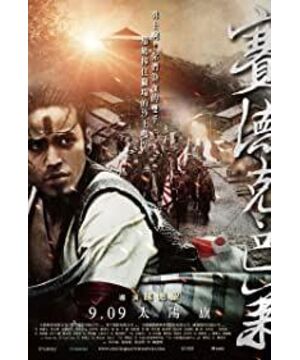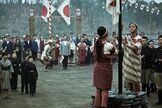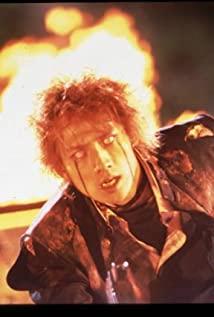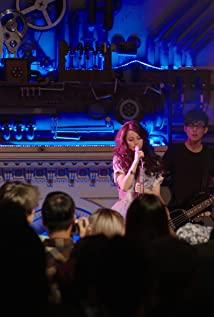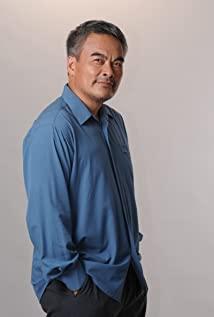Although the name of this place in the film is called Zhuoshuixi, it is not muddy at all. Not only is it crystal clear, but in a common scene in the film, they pass by the water several times, and there is a waterfall hitting from top to bottom and standing on the side. There is a big rock in which the rainbow always appears. There is a scene next to this stream and the rocky beach. Mona Rudo asked Huagang Ichiro, that is, Dutchess:
"Dutches, you are going to enter the Japanese shrine in the future, Is it still the home of our ancestors?"
I think that at that time, Dutchess was extremely conflicted and difficult to choose. Ichiro Huagang represented the mentality of wanting to enter civilization and abandoning the wild, but Dutchess represented respect for his ancestors and nostalgia for Seid. Grams of blood is hard to give up. I don't want to say how the director expresses the tangled heart of Ichiro, I just want to say that this may also represent the conflict between civilization and the wild. We are all civilized people now. We don’t have to live a life of slash-and-burn farming and hunting for a living. We pride ourselves on being better than these barbarians. There are also many Japanese people in the film who scornfully call these people for living. Barbarian is also a derogatory term, so is the so-called barbarian.
However, people's demands are different, but life is the same. Isn't the civilized aircraft cannon also a symbol of savage power, when the so-called civilization forces these aboriginal people to bow down and bend over to the wood, when the civilization enslaves the primitive tribes with contempt, with whipping , high-pressure policy, with a civilized army standing behind it, when others are forced to be slaves, what is the value of the so-called civilization?
Dutchess asked Monaru, "Isn't it bad to be ruled by the Japanese? We now have an education center, a post office, and we can survive without savage hunting." Even Dutchess himself can enter a Japanese school and graduate At the Japanese Teachers College, he joined the Japanese police force. Although he was discriminated against, he has to say that his fate is gradually changing. His wife has accepted Japanese culture. It is foreseeable that if there is no uprising, their life will gradually improve. .
Mona Ludao replied: "Is it good to be ruled by the Japanese? Men are forced to bend their backs to wood, women are forced to kneel to help servants to drink. Post offices? Stores? Schools? Has the life of the tribe changed for the better? Instead Show them how poor they are!"
The confrontation between civilization and savagery!
I have to interject a paragraph here, this is to avoid the problem of understanding the film caused by the problem of Japanese image. The Japanese portrayed in the film are actually mostly good people. Yoshimura is the representative of evil. However, there are also Japanese people like Kojima, who spend their time and effort to understand the people, learn the Seediq language, and even use the Seediq language. communicate with them. Historically, the Japanese ruled Seediq in the early stage is undoubtedly relatively successful. A large number of Japanese police are still willing to communicate with Seediq people. The popularity of Japanese teaching has reached almost 100%, and almost everyone can speak Japanese. Said to be a difficult achievement. Before the outbreak of the Wushe Incident in Japan in 1930, Japan had not yet carried out a large-scale plunder of the wood resources of the Wushe, and the Seediq people were not under much labor pressure, and they adopted the strategy of "controlling the Fans with Fans", and still maintained the various conditions of the Wushe. The state between the branches, registering the hunting operations of the clubs and lending guns for the tribe to hunt. Before the Wushe Incident, there was a strong demand for Japanese militarism. A large number of the original police officers were transferred away. The new police officers were not far from dealing with the tribesmen and ruled savagely. From the film, we can also see that such vicious representatives of Yoshimura are also young. This led to the Seediq people becoming more and more dissatisfied with Japanese rule, and finally the Wushe incident broke out, which is the time when the Japanese school of Wushe was massacred in the film. This is not to say that the Japanese army is not brutal, the brutality of the Japanese army, and the brutality of other colonial rulers in the world, are actually the same.
Therefore, the Japanese can represent a kind of civilization in the early 20th century. The so-called colonial rule is roughly like this. For example, the British ruled India. The Japanese did not massacre Wushe, nor did they rule in a friendly manner. Those who are inclined to educate and punish those who resist are neither bloody and brutal, nor a group of good people as we imagined.
I think the confrontation between civilization and savagery is also shown in this film, but civilization uses savage means to develop the savagery. A way of ruling that hangs guns on other people's heads will certainly not be satisfactory. Mona Ludao led the tribe to forbear for 20 years, and finally broke out. He said, "If you endure for another 20 years, it will not be Sediq, and there will be no hunting ground! The children are all Japanese." We can notice that what he said is not that we will exterminate the clan, but that the children are all Japanese. What the old patriarch was worried about was not that the Japanese would slaughter their entire clan, but that the indoctrination of the Japanese made the clan people not believe in ancestor spirits, but in civilization. What he is worried about is that there is no ancestral teaching, and Seediq's soul will die. This is the way of Mona Ludao. What he wants to protect is not the lives of the people, but the beliefs of the people and the totem of Seediq. Without the totem, Seediq is no different from others, and Seediq is equivalent to self-destruction.
About some primitive and wild beliefs and totems, maybe people who watch this film cannot understand. Those who watch the full version will find that there are scenes of Mona Ludao drinking blood and eating raw venison at the beginning, and they will see many scenes of beheading people. The Seediq people not only do not feel cruel, but hold the beheaded head high above their heads. To show glory, whoever cuts off the heads of the leaders and high officials will become heroes and will be praised by everyone. The development of human civilization must not tolerate such a barbaric way, but this is from the perspective of the entire human and civilization. We are from primitive tribes, not only the Seediq, but there are still many other primitive tribes in the world, who live by hunting. It is conceivable that human beings are dangerous when fighting against wild animals. Wild dogs and wild boars can pose a huge threat to these primitive people. If you do not respect strength, speed, heroes, totems and ancestral beliefs, it is difficult to believe in human beings. Will survive in this situation for thousands of years. Therefore, the person who cut off the head of the ferocious beast not only won the battle against the beast, but also protected other people from the threat of the beast. If the person who cut off the head does not become a hero, the people have no motivation to hone. Body and mind survive and fight in this dangerous jungle. As a result, the primitive tribes also developed the production methods and beliefs of the primitive hunting tribes. The totems and ancestral spirits they believe in are more and more real than many people who believe in gods. They must believe that they will return to the ancestral spirits. That fat hunting ground, the Seediq gained eternal life.
There are also Seediq's songs and dances. When I was watching the film, I suddenly found that some of them understood these songs and dances. In the scene where they cut down a tree and fell down, a Seediq saw the rainbow in the sky, Starting to sing their songs aloud, dance their dances, and then everyone drop their jobs and sing in unison, the scene is truly stunning. The hunting ground, the hunting ground that has been cut down and swallowed up, is the essence of the life of the Seediq people, and it is the place that the poor guarded all their lives. This is the way of Mona Ludao.
"The wine we brew can make people unfettered, let people sing and dance, smile bitterly and casually." This is freedom, this is the freedom that the Seediq people also want under their rule, this is Mona Ludao, and it is also the the way of mankind.
"The Japanese are denser than the leaves of the forest, and more than the stones of a turbid stream, but my determination to resist is stronger than that of Mount Qilai!"
"If your civilization tells us to bow down, then I will Show you our savage pride!"
What a sonorous and powerful sentence!
No one can deprive anyone of the freedom that anyone should have for any reason. Any civilization's conquest of the wilderness is a bloody process. The so-called barbaric pride is actually the pride of all human beings. Anyone who loses the touch of life and the development of human nature is replaced by mechanical labor and high-pressure rule. Above my ancestral spirit, above my clan, and above my Mona Ludao!
It is also necessary to correct the name of the Seediq people here. According to historical investigations, the habit of their drafting is generally not to kill women and children, and the same is true for the ancestors. However, this time, the Japanese women and children were driven out and killed, which changed their previous habits. I am afraid it is because of the deep hatred.
Mona Ludao is a way of resistance, and its later life and the Wushe incident it launched represent the return of human nature. The will and soul that should have been forgotten by living a life of stubbornness, people have gold under their knees, the forbearance of servile lacquer will eventually explode, and a life without soul and dignity, even if there is a civilized appearance, its But it was an empty machine that was eventually abandoned.
A real man can sacrifice his body, but he must win his soul.
2. Looking at the rainbow bridge again, the fable of the soul returning to
the rainbow bridge runs through the whole film. The rainbow appears many times in scenes that reflect the inner changes of the characters, after Mona Ludao questioned Ichiro Huagang, and after Bawan sought the answer from Mona Ludao. In the sky, at the end of the film, there is Mona Ludao leading the fallen warriors, singing tribal songs, and crossing the rainbow bridge that crosses the ancestral spirits. We just hope and believe that the Rainbow Bridge exists, which is not only a consolation to the fallen warriors, but also the final return to the spirit of life.
In any war, there is no winner, and in wars that destroy humanity, only the upper-level rulers who destroy humanity benefit. Perhaps war has promoted some war technologies and the awareness of human beings competing against each other, but for human nature, war is undoubtedly the best machine to oppress human nature. There are many stories in the war, Mona Ludao is undoubtedly the hero of the tribe, and many tribal women who hang themselves and bend tree trunks are not heroes. Humanity has been brutally slaughtered! Women hang themselves so that men can fight better, but do they have to kill women? There is no reason to deprive life. The brutal war deprives life, and even more deprives humanity. Even Timu Wallis couldn't bear to fight again when he saw this scene. He smashed the gun in his hand to the ground, howling loudly, "We won't fight anymore!" Then he said to Kojima, "We fight for the sake of blood sacrifice to ancestors, not to avenge your dead family!"
Kojima was speechless by the questioning, and the situation seemed to be developing towards a duel between the two. However, this time is a war, and the war cannot allow such a thing to happen. In the war, Kojima is the victim, and Temu is the victim. Under the persuasion of calm people, the Japanese and the Daozawa Society still unite to fight against Mona Ludao. The bodies of women and children are dead, but their souls have already returned to the homes of the ancestors. The living people, whether it is Mona Ludao, Kojima, or Tiemu, their souls and humanity have already been affected by the war. The machine was suppressed, and I wondered why Mona Ludao didn't want to hold a funeral for his son Basso first? How come the dead Japanese soldiers are willing to come to this mountain and give their lives? I wonder why Tiemu, who saw the tragic death of his compatriots, didn't want to let it go, the air in Wushe was dignified enough? However, the war was not allowed to stop. "Death in battle! Seediqbale!" Just as the Japanese stopped shelling Mahpo, the clansmen of the Uprising Six Society rushed out of the forest with the shouts of Mona Ludao, and the Japanese in front of them rushed out of the forest. People are fighting to the death to defend their souls.
Both sides suffered huge losses in this battle, and there were too many heroic deeds in this battle that I didn't want to go into details. The Japanese had a steady stream of reinforcements. When Mona Ludao hit the bridge, the other end of the bridge was covered with Japanese cannons, and Sediq Bale was no longer afraid. Back to the pusher of Zuling's house, they are eager to return, Bawan once said: "We are tired, we are really tired." Yes, the whole Seediq is too tired, they are oppressed for twenty Years, they are fighting this hopeless war again, death is only a relief for them, the home of the ancestors is the focus in their eyes, cross the rainbow bridge, the warriors of Sediqbale, your ancestors have already witnessed Your bravery, your way home will be unimpeded, and your soul will finally bloom at the other end of the Rainbow Bridge.
I have heard that a good movie is not used to earn the audience's tears, but more because it should open up people's wisdom about life. Perhaps what we see in the Seediq Bale is mostly the despair of human nature. When the Japanese commander saw the last warrior of the Seediq clan hang himself, he said, "Why am I in this remote Taiwanese mountain, seeing what we have already done? The spirit of Bushido that has disappeared for a hundred years?" The cherry blossoms that bloomed in red at the wrong season may have answered this question, we have witnessed too many samurai, we have been dyed red by the blood of samurai, to show the world, but we hope that we To be able to bloom in the right season, don't let us cherry blossoms come to witness the blood of the samurai, let the people in life witness our beautiful bloom. Just like the Japanese geological exploration team at the beginning of the film, they encountered a cherry blossom forest with excitement. This group of Japanese geological exploration teams, also victims of Bushido, lost their lives in this beautiful cherry blossom forest. The spirit of yearning for life should replace the spirit of Bushido, and the brilliance of human nature should bloom. The progress of civilization is no longer a cruel confrontation. Only when everyone opens up like cherry blossoms and sets off against each other, maybe we can say that we have left the wilderness and entered civilization.
While all this has not yet come, the Henrich case I have seen recently may be a step in wisdom from the spirit of Seediq. The case was a World War II case. Judge Theodore Seidel said at the judgment: "When the law and conscience conflict, the conscience is the highest code of conduct, not the law. Respect for life is a universal principle. ."
Even in dark times, life is still a choice. Kojima respects the choice of his clan is an example. However, he lost his mind because his family was killed in the end. Cong Yong Daozhe took bloody revenge and killed the orphans and widows of the six uprising societies, but his conscience was wiped out by the war. It is conceivable that, An emperor who rose up in war is also so full of hatred, how can he rule rationally.
"Cut it open, cut through your contradictory liver and intestines with one stroke, don't go anywhere, be a free wandering soul,"
Erlang said to Ichiro. The liberation of human nature and the demand for freedom have to be obtained by incision and hanging, and this is the end of life, but the emperor and ancestors who bound Ichiro and Erlang are still there, and the authority that binds human nature is unabated. Is it the weeping of nature?
Life is always a choice, don't use high-pressure politics as an excuse. The souls on the rainbow bridge can finally hear the wisdom of the ancestors, let go of the war and the hatred of the tribe, and gain the freedom of the soul world and the joy of living casually.
Although the rainbow is ethereal, people's hearts are forever.
View more about Sai de ke · ba lai: Tai yang qi reviews


